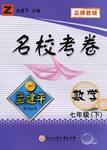题目内容
.
Seeing your picture, I couldn’t resist _____ the days _____ we spent together.
A. to think of; when B. to think of; which
C. thinking of; which D. thinking of; when
C

 华东师大版一课一练系列答案
华东师大版一课一练系列答案 孟建平名校考卷系列答案
孟建平名校考卷系列答案 ---- How about seeing the new movie at the theatre tonight?
---- _____, but I’ve got to go over my notes for tomorrow’s exam.
| A.All right | B.Sounds great |
| C.I can’t | D.No, I am terribly sorry |
完形填空(共20小题 ;每小题1分,满分20分)
阅读下面短文,掌握其大意,然后从各题所给的四个选项(A、B、C和D)中,选出最佳选项
In a land far away, once upon a time there was great poverty (贫困),and only the rich could manage without great 36 . Three of those rich men and their servants were 37 together on a road when they came to a very 38 village.
The first could not stand seeing the poverty, 39 he took all the gold and jewels from his wagons (四轮载重马车) and shared 40 out among the villagers. He wished them all the best of luck, and he left.
The second rich man ,seeing the 41 situation, stopped for a short time and gave 42 all his food and drink, since he 43 see that money would be of little 44 to them. He made sure that they each 45 their fair share and would have enough food to 46 for some time . Then, he left.
The third rich man, on seeing such poverty, 47 and went straight through the 48 without stopping. The two other rich men saw this from a distance and commented with each other 49 indifferent(冷漠的)the third rich man was. It was 50 that they themselves had been there to offer help.
However, three days later, they 51 the third rich man ,who was coming in the opposite direction . He was 52 travelling quickly, but his wagons, 53 the gold and valuables they had been 54 ,were now full of farming tools and bags of 55 . He was rushing back to help them out of poverty.
| 【小题1】 |
|
| 【小题2】 |
|
| 【小题3】 |
|
| 【小题4】 |
|
| 【小题5】 |
|
| 【小题6】 |
|
| 【小题7】 |
|
| 【小题8】 |
|
| 【小题9】 |
|
| 【小题10】 |
|
| 【小题11】 |
|
| 【小题12】 |
|
| 【小题13】 |
|
| 【小题14】 |
|
| 【小题15】 |
|
| 【小题16】 |
|
| 【小题17】 |
|
| 【小题18】 |
|
| 【小题19】 |
|
| 【小题20】 |
|
Every day we go to school and listen to the teacher, and the teacher will ask us some questions. Sometimes, the classmates will ask for your opinions of the work of the class. When you are telling others in the class what you have found out about these topics, remember that they must be able to hear what you are saying. You are not taking part in a family conversation or having a chat with friends—you are in a slightly unnatural situation where a large group of people will remain silent, waiting to hear what you have to say. You must speak so that they can hear you—loudly enough and clearly enough but without trying to shout or appearing to force yourself.
Remember, too, that it is the same if you are called to an interview whether it is with a professor of your school or a government official who might meet you. The person you are seeing will try to put you at your ease (not worried) but the situation is somewhat different from that of an ordinary conversation. You must take special care that you can be heard.
【小题1】 When you speak to the class, you should speak ________.
| A.as slowly as possible | B.in a low voice |
| C.loudly | D.forcefully |
| A.not very different from | B.sometimes the same as |
| C.sometimes not the same as | D.not the same as |
| A.to show your ability | B.to be very gentle |
| C.to make sure that you can be heard | D.to put the official at ease |
| A.that we should talk in different ways in different situations |
| B.that we must speak loudly |
| C.that we must keep silent at any time |
| D.that we must talk with the class |